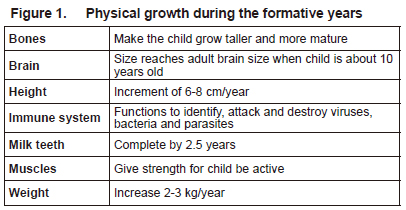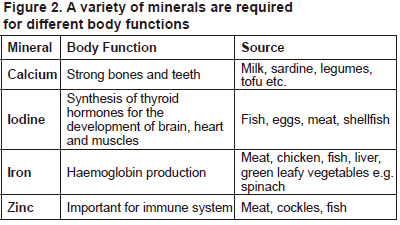
NUTRITION plays important roles in growth and development of children. During infancy, the growth rate is fastest and the rate decreases, as the child gets older. Due to the demands to support growth and development, good nutrition is of greatest importance between one to six years of age, which is the formative stage when physical growth, mental and emotions as well as physical skills develop quite rapidly. During this period, weight, height, muscles, bones, milk teeth, brain and immune system continue to grow and mature (Figure 1). The rate of growth of children, however, depends on the nutrition that they get as well as their genetic background. NUTRITION plays important roles in growth and development of children. During infancy, the growth rate is fastest and the rate decreases, as the child gets older. Due to the demands to support growth and development, good nutrition is of greatest importance between one to six years of age, which is the formative stage when physical growth, mental and emotions as well as physical skills develop quite rapidly. During this period, weight, height, muscles, bones, milk teeth, brain and immune system continue to grow and mature (Figure 1). The rate of growth of children, however, depends on the nutrition that they get as well as their genetic background. How can children achieve good nutrition? The best way to achieve good nutrition is to practice good and healthy eating habits. There are four basic practices of eating healthily: Balance. Ensure that foods consumed are from all food groups namely cereals and products, fruits and vegetables, meat, fish, poultry, milk and eggs. By eating the proper balance of foods, the children will get the proper balance of nutrients that are needed to maintain health.


Moderation. Eat foods in moderation, as it is the key to a healthful diet. Eating the right amounts of foods ensures the optimisation of the body's metabolic process Variety. Children should eat different foods every day. By selecting a variety of foods, they are optimising the chances of consuming the multitude of nutrients the body needs. Eat regularly. Ensure that children eat according to meal times regularly and consistently. Besides eating a balanced diet, in moderation and a variety of foods, children should balance the foods eaten with physical activity to maintain a healthy weight. Maintaining adequate caloric intake (energy) will also support the normal growth and development. Always choose a diet which has plenty of fruits and vegetables, whole grain cereals, moderate meat and milk while low in fat, sugar and salt. Water is vital for maintaining body temperature, excreting body waste products and aiding in digestion. Drink at least 6 to 8 glasses of water to prevent dehydration. Food choices As children grow older, they usually eat what they want if it is convenient and if they have the time. This is quite normal as they will be more involved in after school and social activities. Due to these changes in their daily routine, the tendency to adopt irregular eating habits such skipping meals, eating snacks and consuming unhealthy foods is more likely. A recent study among 6- to 12-year olds showed about a third of children skipped breakfast, while almost a quarter missed out their lunch and dinner
1.

As time constraint is a major reason for skipping breakfast
1, it is recommended that parents and guardians make an effort to introduce easily prepared but nutritious foods for breakfast. Examples of these foods include egg, tuna or sardine sandwiches, bread with peanut butter, and breakfast cereals. For those who do not have an appetite in the morning, a nutritious drink such as milk or fruit juices are recommended.
Nike NUTRITION plays important roles in growth and development of children. During infancy, the growth rate is fastest and the rate decreases, as the child gets older. Due to the demands to support growth and development, good nutrition is of greatest importance between one to six years of age, which is the formative stage when physical growth, mental and emotions as well as physical skills develop quite rapidly. During this period, weight, height, muscles, bones, milk teeth, brain and immune system continue to grow and mature (Figure 1). The rate of growth of children, however, depends on the nutrition that they get as well as their genetic background. NUTRITION plays important roles in growth and development of children. During infancy, the growth rate is fastest and the rate decreases, as the child gets older. Due to the demands to support growth and development, good nutrition is of greatest importance between one to six years of age, which is the formative stage when physical growth, mental and emotions as well as physical skills develop quite rapidly. During this period, weight, height, muscles, bones, milk teeth, brain and immune system continue to grow and mature (Figure 1). The rate of growth of children, however, depends on the nutrition that they get as well as their genetic background. How can children achieve good nutrition? The best way to achieve good nutrition is to practice good and healthy eating habits. There are four basic practices of eating healthily: Balance. Ensure that foods consumed are from all food groups namely cereals and products, fruits and vegetables, meat, fish, poultry, milk and eggs. By eating the proper balance of foods, the children will get the proper balance of nutrients that are needed to maintain health.
NUTRITION plays important roles in growth and development of children. During infancy, the growth rate is fastest and the rate decreases, as the child gets older. Due to the demands to support growth and development, good nutrition is of greatest importance between one to six years of age, which is the formative stage when physical growth, mental and emotions as well as physical skills develop quite rapidly. During this period, weight, height, muscles, bones, milk teeth, brain and immune system continue to grow and mature (Figure 1). The rate of growth of children, however, depends on the nutrition that they get as well as their genetic background. NUTRITION plays important roles in growth and development of children. During infancy, the growth rate is fastest and the rate decreases, as the child gets older. Due to the demands to support growth and development, good nutrition is of greatest importance between one to six years of age, which is the formative stage when physical growth, mental and emotions as well as physical skills develop quite rapidly. During this period, weight, height, muscles, bones, milk teeth, brain and immune system continue to grow and mature (Figure 1). The rate of growth of children, however, depends on the nutrition that they get as well as their genetic background. How can children achieve good nutrition? The best way to achieve good nutrition is to practice good and healthy eating habits. There are four basic practices of eating healthily: Balance. Ensure that foods consumed are from all food groups namely cereals and products, fruits and vegetables, meat, fish, poultry, milk and eggs. By eating the proper balance of foods, the children will get the proper balance of nutrients that are needed to maintain health. 
 Moderation. Eat foods in moderation, as it is the key to a healthful diet. Eating the right amounts of foods ensures the optimisation of the body's metabolic process Variety. Children should eat different foods every day. By selecting a variety of foods, they are optimising the chances of consuming the multitude of nutrients the body needs. Eat regularly. Ensure that children eat according to meal times regularly and consistently. Besides eating a balanced diet, in moderation and a variety of foods, children should balance the foods eaten with physical activity to maintain a healthy weight. Maintaining adequate caloric intake (energy) will also support the normal growth and development. Always choose a diet which has plenty of fruits and vegetables, whole grain cereals, moderate meat and milk while low in fat, sugar and salt. Water is vital for maintaining body temperature, excreting body waste products and aiding in digestion. Drink at least 6 to 8 glasses of water to prevent dehydration. Food choices As children grow older, they usually eat what they want if it is convenient and if they have the time. This is quite normal as they will be more involved in after school and social activities. Due to these changes in their daily routine, the tendency to adopt irregular eating habits such skipping meals, eating snacks and consuming unhealthy foods is more likely. A recent study among 6- to 12-year olds showed about a third of children skipped breakfast, while almost a quarter missed out their lunch and dinner1.
Moderation. Eat foods in moderation, as it is the key to a healthful diet. Eating the right amounts of foods ensures the optimisation of the body's metabolic process Variety. Children should eat different foods every day. By selecting a variety of foods, they are optimising the chances of consuming the multitude of nutrients the body needs. Eat regularly. Ensure that children eat according to meal times regularly and consistently. Besides eating a balanced diet, in moderation and a variety of foods, children should balance the foods eaten with physical activity to maintain a healthy weight. Maintaining adequate caloric intake (energy) will also support the normal growth and development. Always choose a diet which has plenty of fruits and vegetables, whole grain cereals, moderate meat and milk while low in fat, sugar and salt. Water is vital for maintaining body temperature, excreting body waste products and aiding in digestion. Drink at least 6 to 8 glasses of water to prevent dehydration. Food choices As children grow older, they usually eat what they want if it is convenient and if they have the time. This is quite normal as they will be more involved in after school and social activities. Due to these changes in their daily routine, the tendency to adopt irregular eating habits such skipping meals, eating snacks and consuming unhealthy foods is more likely. A recent study among 6- to 12-year olds showed about a third of children skipped breakfast, while almost a quarter missed out their lunch and dinner1.  As time constraint is a major reason for skipping breakfast1, it is recommended that parents and guardians make an effort to introduce easily prepared but nutritious foods for breakfast. Examples of these foods include egg, tuna or sardine sandwiches, bread with peanut butter, and breakfast cereals. For those who do not have an appetite in the morning, a nutritious drink such as milk or fruit juices are recommended.Nike
As time constraint is a major reason for skipping breakfast1, it is recommended that parents and guardians make an effort to introduce easily prepared but nutritious foods for breakfast. Examples of these foods include egg, tuna or sardine sandwiches, bread with peanut butter, and breakfast cereals. For those who do not have an appetite in the morning, a nutritious drink such as milk or fruit juices are recommended.Nike
 iConnectHub
iConnectHub
 Login/Register
Login/Register Supplier Login
Supplier Login



























